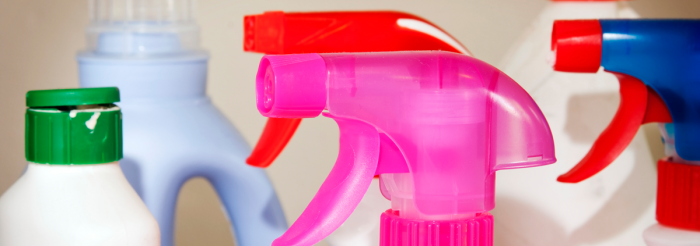Household Toxins

The drive for instant cleaning solutions for busy families has increased the use of strong industrial chemicals in household products, but the long term effects of the use of such chemicals has not been studied sufficiently.
Health Problems
Medical research shows that increases in asthma, related breathing problems, skin irritation, and even some forms of cancer, indicate that we are using too many strong chemicals in our homes. Ironically, a large number of these toxic chemicals are found in cleaning products that are advertised as giving us a germ-free environment.
In the last decade, the incidence of asthma in men has increased 29%, and in women that rise is 82% due in part to larger fat reserves in the female body, where toxins are stored, and also to longer exposure to chemicals because women carry out more household tasks involving cleaning materials.
The Effects on Children
Children are especially at risk from absorption of harmful chemicals used in cleaning products. Small children rub their toys over carpets and floors cleaned with toxic products, handle their toys, and put them in their mouths. Add to that normal behaviour the fact that a child's respiratory rate is three times that of an adult, and you can see that excessive use of chemical products in the home is an undesirable practice.
Without doubt, the main culprits are aerosols, which discharge cleaning products into the air. You should consider using an alternative to any product that demands use only in a ventilated space.
Safe Alternatives
It all sounds very dangerous to use standard household cleaning products, so what is the alternative?
The really good news is that some experts advocate actually cleaning your house less thoroughly and less often. It is perfectly possible to negate any advantages of killing disease and germs in your home by simply replacing one risk with another - that of ingestion of toxic chemicals.
Do you need to spray air freshener ever day? Recent tests proved that instance of diarrhoea in babies increased by 32% in households where aerosol fresheners were used daily, as opposed to those babies living in homes where the freshener was used weekly.
Experts are also advocating the advice that previous generations always told us - a little dirt in the area helps to build the immune system; so maybe daily vacuuming should be reduced to once a week as well.
Although modern living makes convenience cleaning products tempting to buy and quick to use, it is worth considering the alternatives that were used before the advent of chemical cleaners - and that means going back to our parents' and grandparents' cleaning routines.
Vinegar and hot water make a perfectly adequate solution for cleaning greasy surfaces, including glassware and windows.
Soda crystals - also known as washing soda can be used to clean work surfaces, and left overnight, will clean the sink.
Bicarbonate of soda makes an excellent paste when mixed with water to clean the inside of an oven, and the cooker top.
Lemon juice is a serviceable toilet cleaner, it smells fresh, and is totally free of any airborne toxins.
Borax is soluble in water and acts as a mildew inhibitor and a deodorant, again with no chemical side effects.
Beeswax is a natural product so instead of buying an aerosol containing it, use the real thing for a chemical free clean.
The scientific evidence seems to be both good and bad. We are certainly using too many household chemicals that are causing harmful deposits of poisons in our bodies, which are leading to increases in disease. The good news is that the old tried and trusted cleaning methods may be set to make a return because even though they may be more difficult to obtain, and require a certain amount of physical effort to use, in the long run they are far better for us, and most important, for our children.


